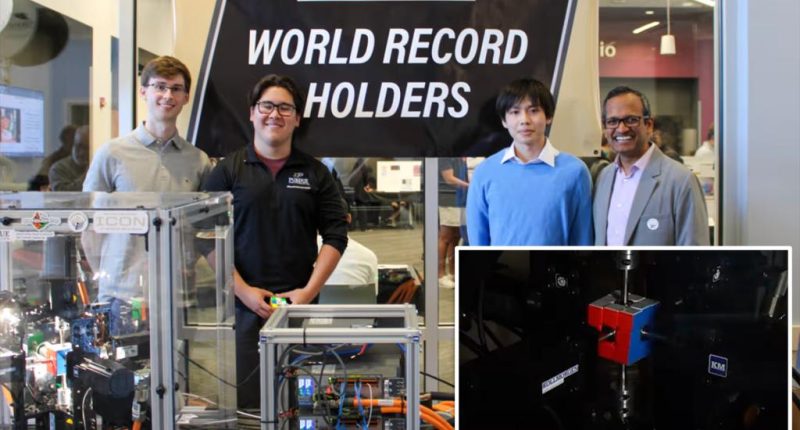Share this @internewscast.com

Donât blink.
In a high-tech David versus Goliath narrative, a team of undergraduate students at Purdue University developed a robot that shattered the world record for solving a Rubik’s cube, a title previously held by Mitsubishi, a gigantic Japanese corporation valued at nearly $80 billion.
The robot, affectionately dubbed the Purdubik’s cube, completed the puzzle in an astonishingly swift .103 milliseconds. Previously, the record was held by Mitsubishi engineers, whose robot achieved the same task in .305 seconds.
“To put it into perspective, the human blink lasts 200 to 300 milliseconds. So, our speed is significantly faster than that. Human reaction time is roughly .200 milliseconds as well, so we surpass that too,” Matthew Patrohay, a team member, explained in a video produced by Purdue. “Essentially, before you even realize it’s solved, we’ve already done it. Before you notice it’s moving, we’ve completed it.”
Purdubik’s Cube was built by a team of students from the university’s Elmore Family School of Electrical and Computer Engineering, according to a release.
The robot was first unveiled at SPARK, a university competition in December 2024. It took home first place, and since then, the team continued refining the robot, Purdue said.
Purdubik’s Cube team of Patrohay, Junpei Ota, Aden Hurd, and Alex Berta earned an official Guinness certification for their creation.
âBasically, weâre a world record holder for the fastest machine solving Rubikâs cube. We currently have a time of .103 milliseconds. We can very reliably solve under the current record of .305 milliseconds — well, the previous world record holder,â Patrohay said with a mischievous grin.
At this point, the researchers said the individual cubes themselves are the biggest impediment to solving the puzzle even faster.
âThe cubes themselves just disintegrate,â he said. âThe pieces themselves snap in half and fall apart.â
In a video, spectators can be seen holding a glowing green button attached to Purdubikâs cube. Once they push the button, thereâs a brief clatter of noise and the puzzle is solved.
In order to achieve the speed they accomplished the team had to make a custom internal core that was stronger and could withstand the tremendous force required while still holding all the pieces together. A super slow motion video shows the Purdubikâs cube solving the puzzle as its metal arms swivel the piece around.
The time puts to shame the human world record holder, Max Park, who solved a cube in 3.13 seconds in 2023. When he broke that record, he was greeted with an explosion of adulation.
Donât expect any John Henry heroics against the mighty Purdubik’s Cube anytime soon. If a human tried to complete a cube at that speed, their muscles would tear from the acceleration, joints would shatter, tendons would evaporate and the skin on their hands would burn.
The human nervous system requires .2 seconds to send a signal â a longer amount of time for Purdubikâs cube to solve the puzzle.
















